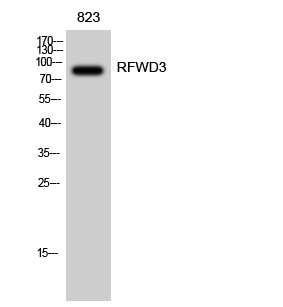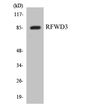RFWD3 Rabbit Polyclonal Antibody
Frequently bought together (1)
beta Actin Mouse Monoclonal Antibody, Clone OTI1, Loading Control
USD 200.00
Other products for "RFWD3"
Specifications
| Product Data | |
| Applications | ELISA, IHC, WB |
| Recommended Dilution | WB: 1/500-1/2000 IHC: 1/100-1/300 ELISA: 1/40000 |
| Reactivities | Human |
| Host | Rabbit |
| Isotype | IgG |
| Clonality | Polyclonal |
| Immunogen | The antiserum was produced against synthesized peptide derived from human RFWD3. AA range:374-423 |
| Formulation | Liquid in PBS containing 50% glycerol, 0.5% BSA and 0.02% sodium azide, pH 7.3. |
| Concentration | lot specific |
| Purification | Affinity Chromatography |
| Conjugation | Unconjugated |
| Storage | Store at 4°C short term. Aliquot and store at -20°C long term. Avoid freeze/thaw cycles. |
| Stability | 1 year |
| Predicted Protein Size | Observed MW (kDa):85 |
| Database Link | |
| Background | Swiss-Prot Acc.Q6PCD5.E3 ubiquitin-protein ligase required for the repair of DNA interstrand cross-links (ICL) in response to DNA damage (PubMed:21504906, PubMed:21558276, PubMed:26474068, PubMed:28575657, PubMed:28575658). Plays a key role in RPA-mediated DNA damage signaling and repair (PubMed:21504906, PubMed:21558276, PubMed:26474068, PubMed:28575657, PubMed:28575658, PubMed:28691929). Acts by mediating ubiquitination of the RPA complex (RPA1, RPA2 and RPA3 subunits) and RAD51 at stalled replication forks, leading to remove them from DNA damage sites and promote homologous recombination (PubMed:26474068, PubMed:28575657, PubMed:28575658). Also mediates the ubiquitination of p53/TP53 in the late response to DNA damage, and acts as a positive regulator of p53/TP53 stability, thereby regulating the G1/S DNA damage checkpoint (PubMed:20173098). May act by catalyzing the formation of short polyubiquitin chains on p53/TP53 that are not targeted to the proteasome (PubMed:20173098). In response to ionizing radiation, interacts with MDM2 and enhances p53/TP53 ubiquitination, possibly by restricting MDM2 from extending polyubiquitin chains on ubiquitinated p53/TP53 (PubMed:20173098). |
| Reference Data | |
Documents
| Product Manuals |
| FAQs |
| SDS |
{0} Product Review(s)
0 Product Review(s)
Submit review
Be the first one to submit a review
Product Citations
*Delivery time may vary from web posted schedule. Occasional delays may occur due to unforeseen
complexities in the preparation of your product. International customers may expect an additional 1-2 weeks
in shipping.






























































































































































































































































 Germany
Germany
 Japan
Japan
 United Kingdom
United Kingdom
 China
China





